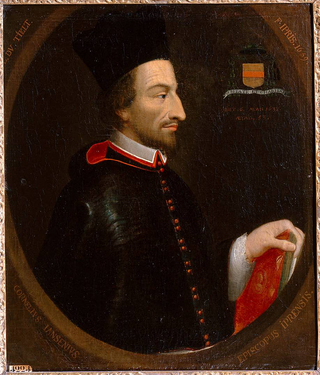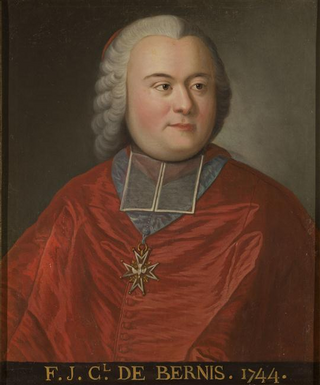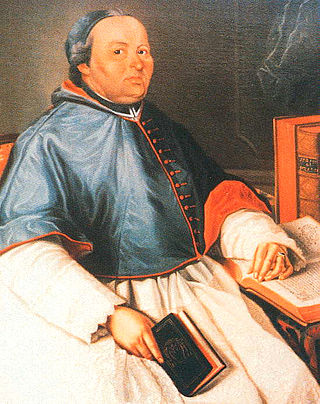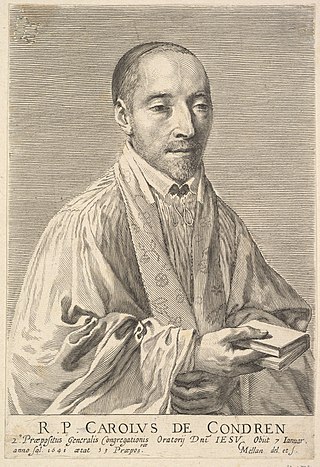
Lettres de cachet were letters signed by the king of France, countersigned by one of his ministers, and closed with the royal seal. They contained orders directly from the king, often to enforce arbitrary actions and judgments that could not be appealed.

The College of Sorbonne was a theological college of the University of Paris, founded in 1253 by Robert de Sorbon (1201–1274), after whom it was named.

Jansenism was an early modern theological movement within Catholicism, primarily active in the Kingdom of France, that arose in an attempt to reconcile the theological concepts of free will and divine grace. Jansenists claimed to profess the true doctrine of grace as put forth by Augustine of Hippo. In 1653, Pope Innocent X promulgated the bull Cum occasione, which condemned five errors attributed to Jansenism, including the idea that Christ did not die or shed his blood for all men.

Augustin Barruel was a French publicist and Jesuit priest. He is now mostly known for setting forth the conspiracy theory involving the Bavarian Illuminati and the Jacobins in his book Memoirs Illustrating the History of Jacobinism published in 1797. In short, Barruel wrote that the French Revolution was planned and executed by the secret societies.

Cornelius Jansen was the Dutch Catholic bishop of Ypres in Flanders and the father of a theological movement known as Jansenism.

Joseph Marie, comte de Maistre was a Savoyard philosopher, writer, lawyer, and diplomat who advocated social hierarchy and monarchy in the period immediately following the French Revolution. Despite his close personal and intellectual ties with France, Maistre was throughout his life a subject of the Kingdom of Sardinia, which he served as a member of the Savoy Senate (1787–1792), ambassador to Russia (1803–1817), and minister of state to the court in Turin (1817–1821).

Charles Simon Favart was a French playwright and theatre director. The Salle Favart in Paris is named after him.

François-Joachim de Pierre de Bernis, comte de Lyonnais was a French cardinal and diplomat. He was the sixth member elected to occupy Seat 3 of the Académie française in 1744. Bernis was one of the most prominent figures in the autobiography of Giacomo Casanova Histoire de ma vie starting from the chapter on "Convent Affairs".

François-Xavier de Feller (1735–1802) was a Belgian Jesuit who after the suppression of his order worked as a prolific and internationally influential journalist and encyclopedist who opposed radical Enlightenment ideas on politics, religion and society, sometimes under the pseudonym Flexier de Reval.

Maurice Blondel was a French philosopher, whose most influential works, notably L'Action, aimed at establishing the correct relationship between autonomous philosophical reasoning and Christian belief.

Paul Gustave Marie Camille Hazard, was a French professor and historian of ideas.

Joseph Pâris dit Duverney or Joseph Pâris Du Verney was a French financier.
Jean Petit was a French theologian and professor in the University of Paris. He is known for his public defence of a political killing as tyrannicide.
The formulary controversy was a 17th- and 18th-century Jansenist refusal to confirm the Formula of Submission for the Jansenists on the part of a group of Catholic ecclesiastical personnel and teachers who did not accept the charge that their beliefs about the nature of man and grace were heretical as the Holy See declared. In the Kingdom of France, it pitted Jansenists against Jesuits. It gave rise to French theologian Blaise Pascal's Lettres provinciales, the condemnation of casuistry by the Holy See, and the dissolution of organised Jansenism.

Jean-Martin de Prades (c.1720–1782) was a French Catholic theologian. He became famous through a thesis he presented that was considered irreligious.

Charles de Condren, Cong. Orat., a Doctor of the Sorbonne, was a French mystic of the 17th century, and is considered a leading member of the French School of Spirituality.
The Abbé Claude Yvon was a French encyclopédiste, a savant who contributed to the Encyclopédie edited by Denis Diderot and Jean le Rond d'Alembert.
William Ambroise Marçais, was a French Orientalist, particularly noted as an expert on the Maghrebi Arabic dialects.

Bernard Cottret was a French historian and literary scholar.
Nathaniel Hooke (1664–1738) was a Franco-Irish Jacobite soldier, diplomatic envoy for the King of France and a Baron in the Jacobite Peerage of Ireland.













